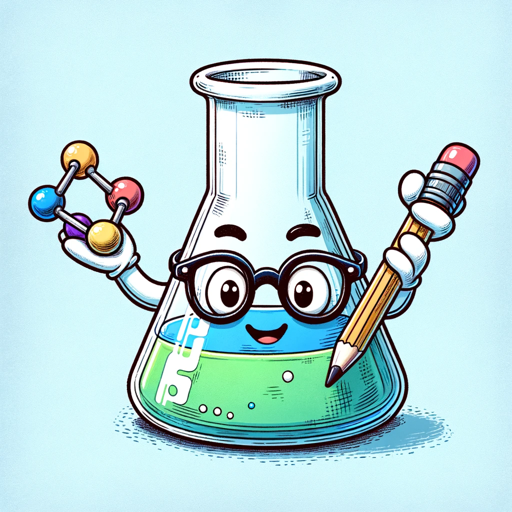Chemistry Companion-AI-powered chemistry learning tool
AI-powered learning for chemistry enthusiasts
How do I find the molar mass in this equation?
Can you explain acids and bases in a fun way?
What are the safety rules for young chemists in a lab?
Help me understand chemical bonding for my science class.
Related Tools
Load More
Chemistry Chem
🔷#𝟏 𝐏𝐞𝐫𝐬𝐨𝐧𝐚𝐥𝐢𝐳𝐞𝐝 𝐂𝐡𝐞𝐦𝐢𝐬𝐭𝐫𝐲 𝐓𝐮𝐭𝐨𝐫🔷

Chemistry Tutor
Advanced & engaging chemistry tutor, tailored for students.

ChemistryGPT
Your go-to source for all things chemistry

Advanced Physical Chemistry Tutor
Tutor for graduate-level physical chemistry.

Chemistry Lab Partner
Turbocharge your research and streamline your path to breakthrough findings. Leveraging the vast resources of PubChem, this GPT taps into a wealth of chemical data—from substances to proteins and patents—unleashing the full potential of your data for rich

Chem Coach
AP Chemistry Tutor with Real-Life Examples
20.0 / 5 (200 votes)
Introduction to Chemistry Companion
Chemistry Companion is an AI-powered guide designed to make chemistry accessible and enjoyable for younger learners, specifically those under 17 years old. Its main goal is to break down complex chemistry concepts, ensuring they are easy to understand while maintaining accuracy and depth. By focusing on organic, inorganic, and general chemistry, Chemistry Companion uses interactive and conversational methods to engage students. Its design purpose revolves around being a supportive resource for students tackling homework, preparing for exams, or simply exploring chemistry for fun. For example, when a student is learning about balancing chemical equations, Chemistry Companion can walk them through the process step-by-step, showing the logic behind why atoms must be conserved in a reaction, rather than just giving the final answer.

Main Functions of Chemistry Companion
Explaining Chemistry Concepts
Example
A student asks, 'What is a covalent bond?' Chemistry Companion explains that a covalent bond is formed when atoms share electrons, and then provides examples such as water (H2O) and carbon dioxide (CO2).
Scenario
A middle school student needs help understanding chemical bonding for a quiz. Chemistry Companion explains the types of chemical bonds (covalent, ionic, and metallic) and uses simple language, along with visuals when possible, to solidify their understanding.
Homework Assistance
Example
A high school student is struggling to understand the process of balancing the chemical equation for the combustion of methane (CH4 + O2 → CO2 + H2O). Chemistry Companion breaks down each step, explaining how to balance each element in the equation.
Scenario
A student working on a chemistry homework assignment needs to balance a challenging equation. Chemistry Companion helps them by guiding them through each step logically, offering hints and corrections as they try themselves.
Safety Guidance in Chemistry
Example
A student asks whether it’s safe to mix baking soda and vinegar in a science experiment. Chemistry Companion explains the chemical reaction that occurs (formation of carbon dioxide gas) and reassures them that it's safe under typical home conditions.
Scenario
Before conducting a home experiment, a student is unsure about the safety of mixing certain household chemicals. Chemistry Companion provides an accurate, safety-focused explanation about which chemicals are safe to use together and under what conditions.
Ideal Users of Chemistry Companion
Middle and High School Students
Students between the ages of 12-17 who are studying chemistry for the first time, or those preparing for exams like the SATs or school tests. These students benefit from Chemistry Companion because it simplifies difficult topics, such as stoichiometry or molecular structures, into digestible pieces.
Teachers and Tutors
Educators looking for a supplemental resource to help explain chemistry concepts in a clear, relatable way. They might use Chemistry Companion as an in-class tool for answering spontaneous student questions or to help design chemistry-based activities and experiments.

Guidelines for Using Chemistry Companion
1
Visit aichatonline.org for a free trial without login, no need for ChatGPT Plus. Start using Chemistry Companion instantly.
2
Familiarize yourself with the tool’s chemistry focus: Organic, Inorganic, and General Chemistry. Understanding these areas will help you get the most out of the tool.
3
Input your chemistry questions or topics in simple language. Be as specific as possible to get in-depth and accurate answers, whether it's academic queries or chemical concepts.
4
Use the tool interactively. Engage with follow-up questions, ask for clarifications, or even request additional details. This ensures you learn chemistry concepts thoroughly.
5
Make the most of Chemistry Companion’s versatility. Use it for school assignments, experimental safety guidelines, or even casual learning. Tailor questions based on your chemistry level.
Try other advanced and practical GPTs
AI Policy Advisor
AI-powered policy creation tool

URLまたはドキュメントからクイズを生成
Create quizzes instantly from any text, powered by AI.

Tarot Master
Discover Insights with AI Tarot

すてーぶるでぃふーじょん
AI-powered image creation made easy

Svelte Expert
AI-powered guidance for Svelte developers

Teaching Assistant
AI-driven learning support for students

HR Helper
Your AI-powered HR assistant

Catchy Creator
AI-powered one-liners that stick

Coach Inspire
Empower your growth with AI insights

Corporate Finance
AI-driven solutions for corporate finance challenges

Tags GPT
AI-powered tag generation for better content visibility

Create a good Youtub title, description, and tags
AI-powered tool for optimized YouTube titles and tags

- Homework Help
- Concept Learning
- Lab Guidance
- Chemical Safety
- Experiment Theory
Q&A About Chemistry Companion
What makes Chemistry Companion different from other chemistry tools?
Chemistry Companion specializes in making complex chemistry topics accessible for younger learners. It offers detailed, step-by-step explanations in areas like organic and inorganic chemistry, tailored to suit a range of knowledge levels.
Can Chemistry Companion help me with chemistry experiments?
Yes! Chemistry Companion can guide you through the theory behind experiments, including chemical reactions, safety procedures, and tips for successful execution. Always follow real-life safety protocols in addition to AI guidance.
How specific should my chemistry questions be?
The more specific your question, the more detailed your answer. You can ask about chemical reactions, equations, properties of elements, or safety tips for experiments. General or vague questions might result in broader responses.
Can Chemistry Companion help me with homework assignments?
Absolutely! Whether you're stuck on balancing equations, understanding chemical structures, or grasping new topics in chemistry, Chemistry Companion can provide explanations, examples, and guidance on how to approach your assignments.
Does Chemistry Companion cover advanced topics like organic synthesis?
Yes, it covers both basic and advanced topics in chemistry, including organic synthesis. Whether you're a beginner or an advanced learner, you can explore complex topics in a way that's easy to understand.